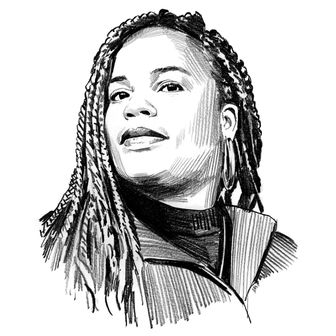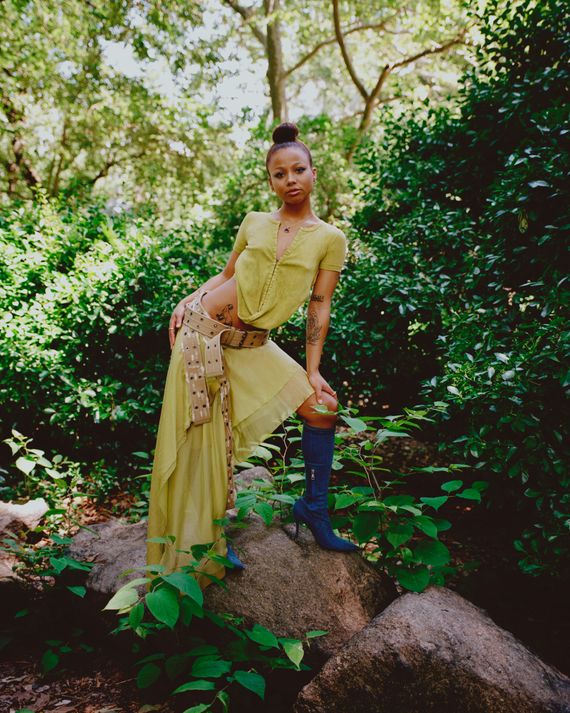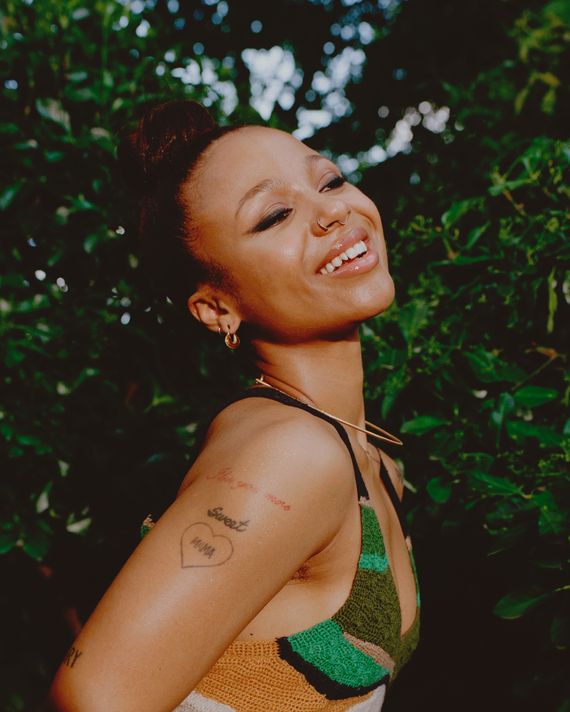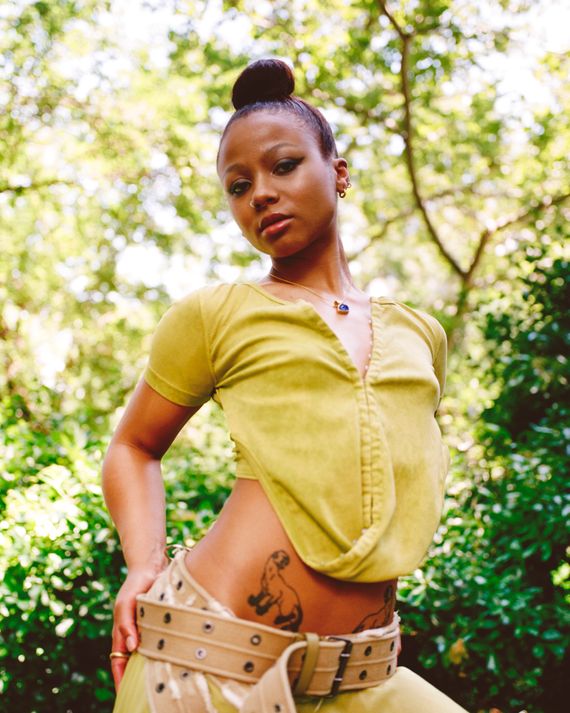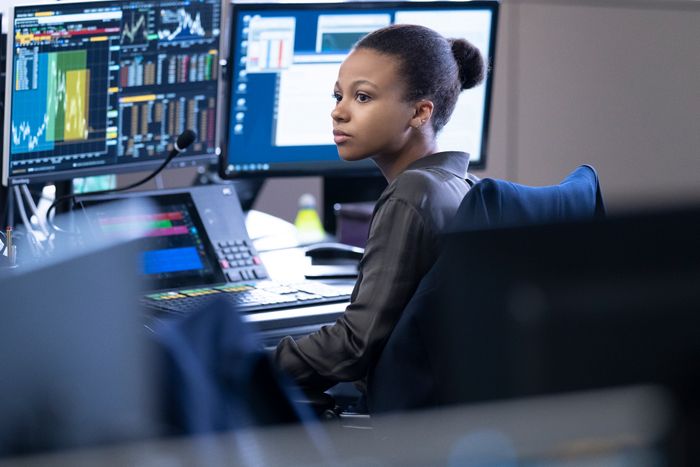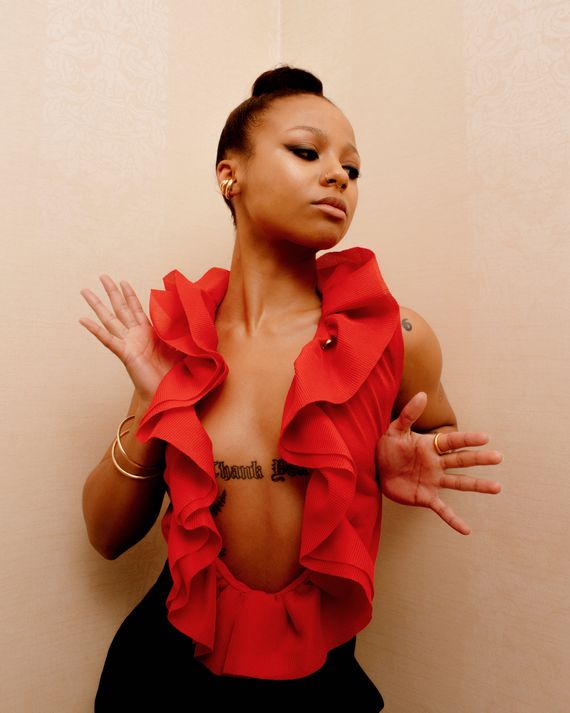
Right before Industry’s first season started taping in Wales, Myha’la Herrold, who plays Harper Stern, the show’s chaotic center, was invited to Lena Dunham’s cottage in the Welsh countryside. Dunham was directing the first episode of the HBO financial drama, and she wanted to get to know the cast. So Herrold and the three actors who play her cutthroat competition at a fictional London investment bank, Pierpoint & Co., joined Dunham for a sleepover. They had tea and Domino’s pizza, Herrold recalls in the chipper cadence you might use to describe your day to your mom. They did some acting exercises and communed with sheep. Toward the end of the night, the director gave Herrold an assessment that she took to heart and repeats now in a near-perfect impersonation of Dunham’s uptalk and vocal tics: “She said, ‘You literally cannot do anything wrong. You are perfect? You’re the best actor in the world, and I literally love everything you do.’ ”
She’d needed to hear that. The days before shooting had been a strange purgatory for Herrold. Here she was, 23 years old (she’s 26 now), nine months out of her musical-theater program at Carnegie Mellon University. This — being at the top of the call sheet of a hot HBO drama — was her first major job and only her third time on-camera. When she’d landed in London (her first time outside the U.S.), she discovered her phone wasn’t working and she didn’t have any friends to hang out with and she didn’t have a sense of self in this strange place. Once in Wales, she waited out the time before shooting started by walking the boardwalk with two other cast members and going to the water park.
It was “disorienting,” she says, and not just because she’s the kind of person who prefers “controlled environments” so much that she chose to meet me at a vibeless Korean-barbecue restaurant in a desolate stretch of downtown Brooklyn because she had memorized the menu and it’s a stone’s throw from her favorite controlled environment, the home she shares with two Siamese cats and her “man.”
The psychological vertigo she described came from an acute case of impostor syndrome. Suddenly, in the downtime before this life-changing job, she was thinking about “the pressure and weight of carrying this huuuge show,” she explains through slurps of her japchae, “and the weight of being the only American Black woman on the show, leading it, feeling like I have to represent all of us.”
She could have spiraled or choked or panicked, but that night at Dunham’s, Herrold remembered herself. “I mean, I’m an Aries. You ain’t gonna tell me nothing. I’m the baddest bitch in here,” she says with a hammed-up swerve of her neck that somehow makes both the astrology identification and the playful pomposity charming. She realized Dunham’s advice was a truth she already knew, then she relaxed. “It gave me the confidence to just do it and to trust that I was there for a reason, you know what I mean? They cast me for a reason,” she says.
Then Dunham took a photo of the group to commemorate the beginnings of big things and to send to her friend Brad.
“Who’s Brad?” one of Herrold’s castmates asked, saying out loud what they all were wondering.
Herrold grabs her phone and turns it toward me, showing the photo of all of them sprawled on a chintzy cottagecore rug in front of a fireplace, none of them aesthetically prepared to have their picture sent to an A-list actor.
“I was like, Whaaaaaaat?!” she says, laughing.
Sitting across from Herrold as she methodically makes her way through her meal, alternating between bites of glass noodles and banchan, is a mysteriously captivating experience, like watching Norwegian slow TV. It’s the same restraint that makes her so interesting to watch: the way she doesn’t rush through her meal or sit back in her chair, the way she has both a nose ring and a septum ring but somehow hasn’t once fiddled with either, the way her slicked-back bun never dares to relent to the evening humidity and spring forth in frizz. This is the focus she brings to her Industry character — controlled, calm, collected.
Despite all outward appearances, Harper, a talented, hopeful trader clawing her way into a permanent job, is a careening force of self-destructiveness. The show follows her and a few other recent grads on the trading floor, as they fuck one another over by day in pursuit of a job and fuck one another at night to distract themselves from whatever existential damage they should discuss in therapy, should they ever have time to go. Industry is basically Euphoria goes to Harvard B-school. Their world is demanding, the hours horrible, the bosses tyrannical, the ketamine so pure, and the sex? Well, the show features some — lots — of the most raw (the squelching and squishing of genitals commingling), complicated, thoughtful, and inventive sex scenes on television. Yes, I’m referring to that scene when Yasmin (Marisa Abela) channels her frustration at being constantly overlooked by going full domme on Oxford golden boy Robert (Harry Lawtey) and demanding he eat his own come right after he ejaculates onto a mirror.
“Well, that depends on where you live, but yeah,” Herrold jokes in regard to finding the come-eating less shocking than I did.
While all the characters are willing to go to great lengths to succeed, Harper goes the furthest. There isn’t a friend, a mentor, a boss, or an enemy she doesn’t shove out of her way. She’s a budding Machiavelli, but she hasn’t developed all the cunning necessary to stick the landing. When Herrold first met Harper on the page, she didn’t quite understand the way she was written. “She was kind of shy and sweaty-palmed and apologetic. When I read it, I was like, ‘Ain’t no way a young Black woman from America is going to walk into this office and apologize for breathing.’ Because we can’t do that. They’re not going to, you know what I mean? That is just not realistic to me.”
She had a lot of conversations with the show’s creators, Mickey Down and Konrad Kay, failed investment bankers who turned their experiences into this series. “They sat me down before filming and said, ‘Listen, we are not Black American women’ ” — they are two British men, one Black, the other white — “ ‘We don’t know this. Here’s the blueprint. Whatever you have, fill it.’ So I just filled it with me.”
Herrold brings a certain physicality to Harper. Although she’s only five-foot-one — and today is dressed like a teenage goth pixie in a black silk maxi skirt and neon-green UGG clogs — as Harper, she looks older and taller; you can see her literally trying to take up space in every scene she’s in. Herrold thought about what she did recognize in Harper: “I too am a young Black woman with ambition and talent and a desire to make something big and beautiful of what I do, and I am surrounded by people who have privileges that I don’t.” Because of those similarities, she understood where the desperation, the need to impress, and the toughness came from, she explains. “If there were a handful of things different in my life, me and Harper would be the same person; however, I don’t act crazy.”
The differences she attributes to the advice and support she has always gotten from her mother, Susan, a hairdresser who is the “life of the party.” It was just the two of them during Herrold’s childhood in San Jose, California. Herrold doesn’t speak about her father, a boundary she announces firmly and cheerfully in the way that only a person who has never had trouble setting healthy boundaries can do. What she does talk a lot about is hanging out at Water Rituals, her mother’s salon. She would come over after school and do her homework or make little potions out of different hair products. Often, she would sit and talk with her mother’s customers. “All her clients were obsessed with me,” she says. She still has the air of someone accustomed to being the precocious young person in a group of older people.
As for the rest of her childhood? “California’s beautiful. The weather is great,” she says. Statements like that usually mean you have either a dogged allegiance to California or nothing else nice to say about it because you have a dogged determination to get out. Herrold was a really creative kid stuck in a cookie-cutter suburb and mixed race in a predominantly white community of people “who mostly did not leave.” She was always experimenting with her look: She waxed the shit out of her eyebrows; she had dreads up until she was 8 years old; one day, her hair would be one color, then she would mix it up and dye it something else; and she experimented with braids and weaves. She still changes her hair constantly (and mostly does it herself) — Bantu knots one day, a blowout the next. She’s growing out a Kelis-red dye job and gestures to her eight months of roots.
But as in most origin stories, feeling like an outcast was useful. It gave her the determination to escape to Broadway, which was all she’d wanted to do since she was a 6-year-old performing “Puttin’ on the Ritz” in a little top hat at her dance recital. She never doubted the validity of her plan to become an actress, and with Susan’s support, it seemed as reasonable and practical a career choice as becoming, say, an accountant. Her mother never once asked if she had a plan B. “She was never concerned about a job,” Herrold says. “She just believed that I was going to make it happen. I do attribute that confidence and love for myself to her completely.”
When it came time for college, she auditioned for the ten best schools. “I had a reckless abandon about me,” she says. “I wasn’t afraid. I wanted it. I got into quite a few schools that I applied to, which was very nice.” She slurps a noodle in defiance of the humility women are expected to display to downplay their achievements. “And then I told everyone who didn’t think I deserved it to kick rocks.”
She decided to study musical theater at Carnegie Mellon. She got tattoos and lost some of her suburban gloss and theater-kid habits, though she’s still prone to hamminess. She found her people, friends whom she still sees for Friends-giving, Halloween, and birthdays. After graduation, as she began to audition for theater, she hit her first obstacle: She found she wasn’t getting the attention she wanted from the theater world. “I was like, I don’t really want to do Frozen. I want to do something new. And there were so many new stories in TV and film, and I loved that,” she says. “I was also like, The paycheck is cute.” That obstacle was actually an opportunity, she’d realized. She started auditioning for TV gigs. And only a few days after she sent in an audition tape, she was asked to come do an in-person director session with Dunham. A week later, she had the job.
Industry is a show about money, but it’s also about control. Every exchange on the show is an assertion of someone’s power: When someone is sent to get a salad, when someone has sex, when someone is permitted to talk to a client, when a client makes a move on a trader — everyone is vying for control over another person because they rarely have control over themselves. Season one ended with most, if not all, of the main characters in a downward spiral and jeopardizing their careers, relationships, and mental health. In season two, which begins August 1, the party scenes are still good, the cocaine still pure, ketamine still preferred, money still king, and Robert still looking for a domme (or a mom), but the world is even more unhinged than their personal lives. The story picks up after COVID, and in the absence of certainty, characters try to create an artificial sense of control: Some wear masks and rubber gloves and pretend they can dominate a pandemic; others go full BDSM on their fuck buddies. Harper lives in and works out of a hotel room, her own hermetically sealed safe space, so she doesn’t have to face the mess she made last season, when in order to secure her job, she savagely betrayed a female manager and wound up with no friends or allies except for one toxic male boss. Now, she’s trying to make up for her sins by landing a big client, a control-freak billionaire played by Jay Duplass who constantly tests her.
The same week season two airs on HBO Max, Herrold’s first major movie, Bodies Bodies Bodies, premieres. She’s a central character in the murder-mystery comedy about a group of friends who gather for a hurricane party and turn on one another when one is found dead. It’s essentially Clue for Gen Z and has the ingredients to be a buzzy career booster. Herrold stars alongside Lee Pace, Rachel Sennott, and Pete Davidson. The shoot required Herrold to act in a storm simulator with giant sprinklers and fans that generate 40-mph winds. She felt like she was about to be blown away in the gusts but somehow managed to hold her ground. (Yes, that’s a tidy metaphor for her preparedness for the inevitable chaos of her career taking off.)
Herrold has been learning more about control in regard to her professional life. She’s figuring out what she will reveal in conversation — nothing about her dad or any incriminating stories from nights on the Bodies set (which left us with a single anecdote about the time Herrold, who is gluten-free, accidentally ate a meatball that had gluten in it at a dinner), but she’ll talk openly about her boyfriend, Armando Rivera, whom she met during the peak of COVID. He slid into her Instagram DMs to congratulate her on the show; she DM’d him back. They Zoomed for almost two hours and kept talking hours a day for a month. Finally, they met in person for an outdoor date, sharing wine six feet apart until Herrold whipped out the hand sanitizer, applied it, and asked if they could hold hands. It was better than sex, she reports, comparing it to that moment in Avatar when the Na’vis’ braids connect and they are mated for life. “I’m corny as hell, and I’m here to tell the tales,” she says, laughing.
In the early days on set, Herrold had to figure out how much she could ask for and how much power she had or should exercise. “I was really afraid of being seen as the American diva,” she explains. “When I came in, there were so many people who were like, ‘Here comes No. 1! Oh, she must be a diva,’ but I realized I was my only advocate. If I didn’t speak up for myself, no one was going to go out of their way.”
For the all-important sex scenes — to which she is happy to lend her body because sex is part of how we live, she says, and she’s down to help break taboos while “making a cute paycheck” — she learned to set boundaries for how she and her castmates are treated. She asked that sex scenes be shot at times when they wouldn’t be interrupted by meals because nobody wants to smell someone’s lunch when up close and personal in each other’s faces, breasts, genitals, asses, etc. She also firmly requested the kind of pubic hair she wanted on her genital prosthetic. First season, she had a landing strip, but in the second season, Herrold asked for a full bush. “I made them add more hair. I was like, ‘That’s not enough bush for me. You better be able to braid it or I don’t want it.’ ” Ultimately, though, it didn’t matter. She had the exact bush she wanted, but she also had the power to say, “I don’t want to show pubic hair anyways.” And they didn’t.


